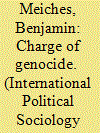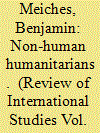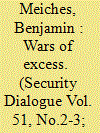|
|
|
Sort Order |
|
|
|
Items / Page
|
|
|
|
|
|
|
| Srl | Item |
| 1 |
ID:
164644


|
|
|
|
|
| Summary/Abstract |
This article examines the role of racism in the development of genocide prevention and humanitarian intervention. It offers a brief history of the We Charge Genocide petition during the early 1950s. This petition demonstrated the potential for the emerging international law on genocide to challenge prevailing racial hierarchy. The movement triggered potent racialized anxieties amongst the United States and other colonial powers. Partly as a consequence of this movement, genocide was undermined as a potent international discourse. This article shows how decades later the renewed interest in genocide emerged without any sense of the connections between genocide discourse and protests against racial inequity. As a result, the antigenocide regime viewed genocide principally as a problem of state power rather than racial and colonial hierarchies. This ultimately fostered the development of a postracial regime of global governance in humanitarian institutions, which understand racial conflict as a site of political management rather than a factor in the formation of inequity and violence. The article describes how the suppression of these early struggles for racial justice depoliticized many of the sources of mass violence in the present and influenced the trajectory of practices of humanitarian intervention and genocide prevention.
|
|
|
|
|
|
|
|
|
|
|
|
|
|
|
|
| 2 |
ID:
164433


|
|
|
|
|
| Summary/Abstract |
The study of humanitarian intervention typically focuses on the human victims and saviours in armed conflict and natural disasters. Moreover, explanations of the virtues of humanitarian norms and ethics emphasise the importance of the university of suffering and the empathic nature of humanitarian efforts. In contrast, this article explores the neglected world of ‘non-human humanitarians’. Specifically, the article outlines three cases of non-human actors that expand and complicate international humanitarian practices: dogs, drones, and diagrams. Drawing on new materialist and posthuman literatures, the article argues that non-humans possess distinct capacities that vastly expand and transform humanitarian efforts in ranging from relief, to medicine, to conflict resolution. Highlighting non-human humanitarians thus offers a new perspective on the resources available for redressing mass violence and conflict, but also complicates existing definitions of humanitarian norms. To the contrary, the article demonstrates that non-humans often maximise humanitarian services to a degree greater than their human counterparts, but have also introduced changes into humanitarian practices that have problematic unintended consequences. Non-human humanitarians reveals previously discounted participants in international politics and the key roles they play in various international interventions.
|
|
|
|
|
|
|
|
|
|
|
|
|
|
|
|
| 3 |
ID:
141463


|
|
|
|
|
| Summary/Abstract |
Critical scholarship on the camp tends to focus on the institution’s historical role in producing forms of social exclusion often by linking the emergence of the camp to the creation of abstract political divisions such as citizenship and nationality. While this approach has unquestionable value, it overemphasizes the importance of social constructions in the history and development of the camp. This article calls for a re-examination of the material elements composing camp spaces by offering attention to how non-human entities and processes contribute to the development of practices of confinement, security and governance. Drawing on the work of Manuel DeLanda, Gilles Deleuze, and Félix Guattari, this article develops an outline of the camp as a material assemblage and examines how the camp emerges from the interaction of barbed wire, war, and the rise of motorized transport. This process of historical emergence helps to explain the elastic and transient dimensions of the camp as constitutive of a new form of fluid political control. Moreover, the article claims that attending to the materiality of the camp helps to explain the expanding role that camps will play in the future of political governance.
|
|
|
|
|
|
|
|
|
|
|
|
|
|
|
|
| 4 |
ID:
141782


|
|
|
|
|
| Summary/Abstract |
Critical scholarship on the camp tends to focus on the institution’s historical role in producing forms of social exclusion often by linking the emergence of the camp to the creation of abstract political divisions such as citizenship and nationality. While this approach has unquestionable value, it overemphasizes the importance of social constructions in the history and development of the camp. This article calls for a re-examination of the material elements composing camp spaces by offering attention to how non-human entities and processes contribute to the development of practices of confinement, security and governance. Drawing on the work of Manuel DeLanda, Gilles Deleuze, and Félix Guattari, this article develops an outline of the camp as a material assemblage and examines how the camp emerges from the interaction of barbed wire, war, and the rise of motorized transport. This process of historical emergence helps to explain the elastic and transient dimensions of the camp as constitutive of a new form of fluid political control. Moreover, the article claims that attending to the materiality of the camp helps to explain the expanding role that camps will play in the future of political governance.
|
|
|
|
|
|
|
|
|
|
|
|
|
|
|
|
| 5 |
ID:
175126


|
|
|
|
|
| Summary/Abstract |
Both classical and critical studies of warfare often comment on the relationship between war and excess. However, even in richly theoretical work, this connection is unanalyzed. This article focuses on the link between excess and war, and seeks to deepen our understanding of why excess reappears so frequently in the study of armed conflict and security studies. Specifically, the article turns to the work of Georges Bataille, an overlooked figure in the critical tradition, who extensively theorized linkages between excess and war. In Bataille’s thought, excess is a key term for explicating the design, mobilization, and transformation of war. Moreover, Bataille sees the exposure to excess as playing a key part in social attachments to violence and armed conflict. The article unpacks how Bataille theorizes excess and applies his insights to the context of precision warfare. Using the case of the accident in the era of precision war, it reveals how Bataille anticipates many of the dynamics that structure late warfare through his understanding of excess. The article concludes by describing how Bataille’s vision of excess would challenge critical war and security studies literatures in relation to the problems of war experience, relationships to death, and scholarship.
|
|
|
|
|
|
|
|
|
|
|
|
|
|
|
|
|
|
|
|
|